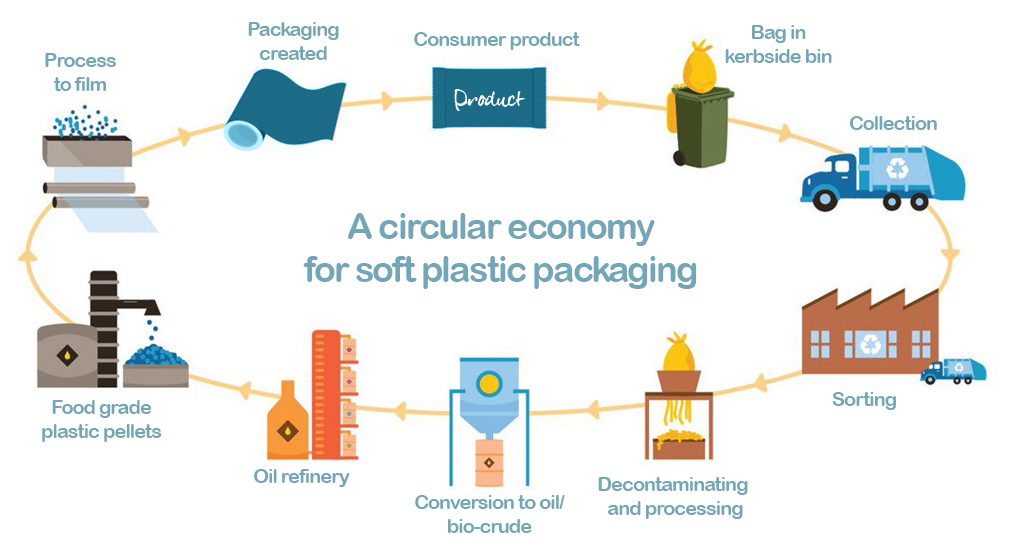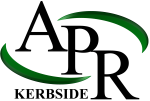The National Plastics Recycling Scheme (NPRS) project is being developed by Australia’s food and grocery manufacturing industry with funding support from the federal government. The NPRS project is designing Australia’s largest industry-led plastics recycling scheme, taking hard-to-recycle soft plastic packaging out of waste streams and giving it new life.

- The NPRS will collect soft plastic packaging, things like bread and cereal bags, frozen vegetable packets, confectionery wrappers and plastic toilet paper wrap.
- As an industry-backed scheme, food and grocery manufacturers pay a small levy to support the cost of collection and administration.
- Collection will be through an expanded kerbside collection program.
- The bags are extracted from recycling streams at sorting facilities and sent for processing.
- After being sorted, cleaned and shredded, separate soft plastic types are sent to advanced recycling facilities where high-tech processes break the plastic back down into oil – the same type of oil that plastic is made from in the first place.
- That “plasticrude” oil is then ready to be made back into clean, food-grade plastic packaging.
About the trials |The National Plastics Recycling Scheme (NPRS) project is driven by Australia’s food and grocery manufacturing industry. Led by the AFGC, the NPRS project is designing a scheme to take hard-to-recycle soft plastic packaging out of the waste stream and recycle it into new, food-grade material. As a true circular economy model, the NPRS project aims to make it easier for people to recycle soft plastics at home and support the development of a new, advanced recycling industry here in Australia.
Collecting at scale | The AFGC received federal funding for the NPRS project in 2020 and since that time our work, and FMCG company commitments to purchase recycled content, have changed the landscape for soft plastics recycling in Australia. New confidence has led to announcements by several companies to make capital investments in new, advanced recycling infrastructure and a supply chain that can create food-grade recycled soft plastic packaging.
The NPRS project is now focused on scaled collection and has secured broad support from local councils and the waste and recycling industry for kerbside collection of soft plastics. To find the best model for expanded kerbside collection and processing, limited trials of kerbside collection are being carried out in six Local Government Areas across Victoria, New South Wales and South Australia from November 2022 to March 2023.
Dedicated kits for bag-in-bin trials | Households in trial areas receive specially produced kits containing information on what soft plastics can be recycled and how to recycle them. The kits contain special recycling bags produced and printed for the trial. Participants will be instructed in how to fill the bags, close them and put them in their yellow-lid kerbside recycling bin. Only households in the selected trial areas can take part in the bagged soft plastics recycling trial.
The bins will be collected and taken to a Materials Recovery Facility (MRF) as usual. At the MRF, the recycling bags will be extracted from the waste stream and sent for sorting and processing. The trials will help design the model for kerbside collection and sorting, one that provides a clean stream of used soft plastics and can be scaled up for an emerging advanced recycling industry.
Gathering data | Some councils have decided to run their trials for up to 12 months but the NPRS project will gather data at the three month point to assess the uptake and effectiveness of collection and sorting, as well as quality of material returned. A customer satisfaction survey will also be conducted. All this information will map the landscape of Australian soft plastics recycling for the first time.
AFGC member companies have signed on as Foundation Supporters of the NPRS project, committing funds to the trials and pilots.
The NPRS is a key plank of helping to meet Australia’s National Packaging Targets. By laying out a plan for plastics recycling from collection, through recycling and onto new end markets, the NPRS will help build a genuine circular economy for plastic packaging.
The NPRS aims to increase the amount of plastic recovered by 190,000 tonnes a year – that’s almost 38,000 five-tonne garbage trucks and one third of the soft plastic waste that currently goes to landfill each year.
This will be achieved through kerbside collection of soft plastics and expanded bring-back systems to create a clean stream of valuable materials to be recycled and remanufactured as new plastic packaging, ready to head back to the supermarket shelf.
